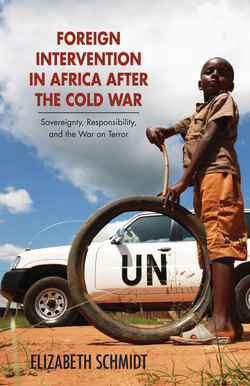Foreign Intervention in Africa after the Cold War

Реклама. ООО «ЛитРес», ИНН: 7719571260.
Оглавление
Elizabeth Schmidt. Foreign Intervention in Africa after the Cold War
Отрывок из книги
Foreign Intervention in Africa after the Cold War
This series of publications on Africa, Latin America, Southeast Asia, and Global and Comparative Studies is designed to present significant research, translation, and opinion to area specialists and to a wide community of persons interested in world affairs. The series is distributed worldwide. For more information, consult the Ohio University Press website, ohioswallow.com.
.....
The expanding role of China on the African continent has been the focus of considerable attention, both in Africa and in the West. The United States and Western Europe have seen their African trade and investments eclipsed by those of the Asian giant. Their leaders have warned that Beijing is exploiting African resources, taking African jobs, supporting African dictators, and demonstrating disregard for human rights, good governance, and sound environmental practices on the continent. African civil society organizations have frequently leveled the same criticisms—although many note the irony in the concerns of former imperial and Cold War powers, which historically have engaged in similar practices. Chinese involvement is primarily economic, rather than political or military, and thus falls outside the scope of this study. However, because Beijing’s practices may be laying the groundwork for future conflicts, a brief description of China’s impact on the continent is warranted.
The People’s Republic of China developed an interest in Africa during the Cold War, when it supported African liberation movements and governments that strove to build socialist societies—as well as others that opposed Beijing’s Cold War rivals. Seeking allies in the global arena, China was motivated principally by politics rather than economics. Its attitude shifted in the mid-1990s, after a massive program of industrialization and economic development transformed the Chinese economy into one of the world’s most powerful. Africa was no longer viewed as an ideological proving ground, but rather as a source of raw materials and a market for Chinese manufactured goods. By the first decade of the twenty-first century, China had surpassed the United States as Africa’s largest trading partner, and it had become the third-largest source of the continent’s direct foreign investment. In exchange for guaranteed access to energy resources, agricultural land, and other strategic materials, China spent billions of dollars on African infrastructure—developing and rehabilitating roads, railroads, dams, bridges, ports, oil pipelines and refineries, power plants, water systems, and telecommunications networks. Chinese concerns also constructed hospitals and schools and invested in clothing and food processing industries, agriculture, fisheries, commercial real estate, retail, and tourism.
.....